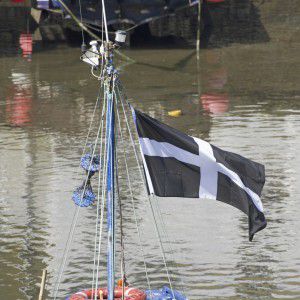EuroTalk Egg-Smashing Championship 2016 – Who Will Win?
It’s Easter, which for some of us means chocolate eggs or hot cross buns, but here at EuroTalk we’re celebrating with another tradition: egg tapping. It’s very simple, so you can do it from home:
1) Boil a load of eggs, one for each participant.
2) Decorate the eggs- This can be done in a number of ways, the most popular of which may be to boil them with onion skins to make a reddish finish. If you’re feeling artistic, press some leaves against the unboiled eggs and secure them with an old stocking, then boil them to leave the impression of the leaf. You can also paint the egg after boiling. Here at EuroTalk, we enjoy personifying our eggs so we put little warrior faces on them (with some of them even going to the effort of putting their war-paint on!)
3) Arrange yourselves into pairs, and in each pair tap first the tops of your eggs together, then the bottoms. If an egg cracks, it loses the round, and you have to eat it. The winner is the one whose egg survives the longest!
The EuroTalk Championships:
Round 1: Alex versus Ioana: After a small amount of cracking on the top of Alex’s egg, Ioana really smashed her advantage home by shattering the bottom of her opponent’s egg: a clear winner.
Round 2: Safia versus Nat: The initial tap only drew a tiny crack from Safia’s egg, but the second tap left the same egg in shreds whilst Nat’s was still uninjured.
The Final: Ioana versus Nat:
Nat’s egg suffered a major injury in the first round, but a strong grip during the second tap left Ioana’s egg struggling in the ring, and Nat’s egg was crowned the winner of this year’s 2016 Egg Smashing Championships!
We celebrated by eating all the egg participants, winners and losers, to prove that no foul-play (concrete fillings etc.) had been perpetrated in the preparing of the eggs.
Tune in next year to see how the eggs perform!
Kernow Bys Vyken!
It’s not often you hear the Cornish language spoken in the streets of London. To be honest, it’s not often you hear it in the streets of Cornwall, although I promise it does happen, if you know where to look.
But this weekend was an exception, because Saturday was St Piran’s Day, the national day of Cornwall, and London was celebrating in style with its annual Shoreditch celebration, Kernow In The City.
So what’s it all about?
Drinking heavily!
No, I’m joking, of course – in fact, I find St Piran’s Day is one of the more sober Cornish celebrations, as it’s really more about celebrating the culture of Cornwall. Back home, different towns have different traditions, but usually there’ll be music and singing, a parade of some sort, perhaps some dancing and dressing up, occasionally a pasty competition. In Westminster, the Cornish MPs hold a cultural reception which aims to teach more about Cornwall’s identity and culture.
The Shoreditch evening event, which I’ve been going to for a good 4 or 5 years, is also primarily a cultural celebration, with different Cornish talent every year and a heavy focus on music (this year featured the amazing Flats and Sharps as the grand finale, last year saw The Oggymen taking centre stage), as well as a variety of comedians (The Kernow King has been guest of honour in the past, and still usually makes a remote appearance via video).
But get a lot of pining ex-pat Cornish together and a few kegs of Betty Stogs beer and it will inevitably turn into a somewhat tipsy affair, with plenty of drunken dancing by the end of the evening. And that’s part of the reason I love Kernow In The City: every year I take along a few non-Cornish people, who tentatively agree to attend in the full expectation of being hounded out of the venue for being English, and although some of the in-jokes about miniature Cornish villages do go over their heads, and the bilingual compering leaves plenty to be understood, by the end of the evening they’re usually bellowing out the words to Trelawney (our national anthem) with great passion, and dancing with total strangers.
Nothing could do more to dispel the myth of the Cornish cold shoulder than the St Piran’s Day event: take a small interest in Cornish culture and you really will be welcomed with open arms. Learn a couple of words of Cornish and you’ll be the talk of the town. And if you’re going to learn anything, learn these three words: Kernow Bys Vyken (Cornwall For Ever), a toast to make you Cornish friends for life.
Proper job!
Nat
Not your average Monday: what’s so special about 29th February?
Happy Leap Day! The 29th of February comes around every four years, but how much do you know about this extra day?
What is Leap Day?
Originally the Sumerians divided the year into 12 months and allocated 30 days for each month. This was adapted by the Egyptians, who realised that this didn’t fit in with the amount of time taken for the Earth to orbit the sun. The Egyptians decided to add five days in at the end of each year to give us the 365 days we have now; however, these five days were just for partying and celebrations – sounds good, right?! The leap year then came about from the Gregorian calendar, with the idea that one day would be added onto February every four years.
Leap years around the world
No one seems to know why it is called a ‘leap’ year, but there are other names for it around the world. In German a leap year is called ‘Schaltjhar’, in Russian it is ‘année bissextile’ and in French it is similar with ‘anno bisestile’. Interestingly in Italian it is called ‘l’ann d’la baleina’ which translates to ‘the whale’s year’, after a belief that whales only give birth during leap years. In many countries a leap year is believed to be bad luck; Russia and the Ukraine believe that getting married or buying a house during a leap year is unlucky. In Taiwan it is considered really unlucky; the Taiwanese go so far as to say that parents are more likely to die during a leap year.
What’s all this about women proposing?
 Perhaps the most well-known leap year tradition is the idea that women can propose to men in this year. This is believed to be introduced by an Irish nun who thought that women had to wait too long for suitors to propose and convinced St Patrick to give women permission to ask a man to marry them once every four years. It was thought that if a woman did want to propose she had to wear breaches or scarlet petticoats in order to do so.
Perhaps the most well-known leap year tradition is the idea that women can propose to men in this year. This is believed to be introduced by an Irish nun who thought that women had to wait too long for suitors to propose and convinced St Patrick to give women permission to ask a man to marry them once every four years. It was thought that if a woman did want to propose she had to wear breaches or scarlet petticoats in order to do so.
In certain European countries it was thought that if a man refused the proposal they should pay a penalty. In Finland they had to buy the lady fabric so she could make her own skirt. In Denmark, the suitor had to buy her twelve pairs of gloves so the lady could hide her embarrassment at not having an engagement ring.
What if you’re born on 29th February?
People born on the 29th have to decide which day to celebrate their birthday for the other three years. However the chances of being born on the 29th of February are 1 in 1,461. For those that are born on this day, the city of Anthony (next to Texas) celebrates the leap year with a four-day festival; this is done to celebrate the leap year babies’ birthdays. There are also Facebook groups for people born on this day, and many restaurants and retailers offer ‘leap day’ deals.
Is it your birthday today? Or did you propose?! Tell us about it!
New Year traditions around the world
Happy New Year! Whether you’re already there, or have a few more hours to wait, we hope that 2015 will be a fantastic year and bring you everything you hope for.
As the celebrations get underway, here are a few interesting New Year traditions from around the world…
Twelve grapes
In Spain, eat a grape for each strike of the clock at midnight; if you manage to eat all twelve during the chimes, you’ll have twelve months of good luck.
First-footing
This is the tradition of being first into a house after midnight, in Scotland and Northern England. The first-foot should bring gifts of a coin, bread, salt, coal, or whisky, which represent financial prosperity, food, flavour, warmth and good cheer. The best kind of first-foot is believed to be a tall, dark-haired man.
Kissing
A tradition from German and English folklore says that you must kiss someone at midnight, and that that person will be significant in your future. If you don’t kiss anyone, it means you’re doomed to a year of loneliness. Apparently.
Yellow underwear
In Chile, if you want good luck and prosperity in the new year, wear yellow underwear – inside out – and then turn it the right way after midnight.
Making a lot of noise
In the Phillippines, the New Year’s custom is to make a lot of noise at midnight, to frighten away evil spirits. People buy small horns called torotots and also use paputok (firecrackers) as well as banging pots and pans and revving their vehicle engines.
Burning ‘Mr Old Year’
In Colombia, the previous year is seen out by families as they build large stuffed male dolls filled with different materials, and items that they no longer want or that have sad memories attached to them. Then they burn the doll at midnight, which represents burning the past and looking to the future.
Lentils
The first thing you should eat after midnight in Hungary is lentil soup, because it’s believed that lentils will bring you riches in the new year – and the more lentils you eat, the richer you’ll be.
New Year Dip
In various towns on the Welsh coast, brave swimmers take a dip in the freezing sea on New Year’s Day. Some people do it in fancy dress – and no, we don’t know why.
How will you be celebrating the New Year? Whatever you’re doing we hope you have a great time!
Learning a language – why bother?
Today, we’re excited to introduce Amy, our new sales and marketing assistant. Amy’s going to be with us for the next twelve months while on her placement year from university, and she’s written today’s blog post, about why learning a language is one of the most important things you can do.
When you ask people if they can speak another language or if they would like to learn one, the response is often, ‘Why? What’s the point, everyone speaks English?’ Here at EuroTalk we want to change this perception and to show you why learning a language can be rewarding, enlightening and open up so many more opportunities.
Yes, it may be easier when visiting another country to assume they will speak English, and very often they do in the main cities and tourist areas, but what if you want to explore off the beaten track and find the soul of a country? Do you want to feel apprehensive, excluded and unable to participate, or do you want to be able to jump in with both feet, get to know local people, their customs and truly the best places to visit and eat, not just the latest Top 10! Without the ability to speak the language it is difficult to get to the heart of a country and to appreciate its people or culture in any depth, you can end up merely skimming a clichéd surface.
If you know the language, you will enjoy meeting people rather than feeling awkward and are likely to make some good friends as well, an even greater benefit if travelling alone. In life, isn’t it as much about the people you meet and the experiences you share, as where you were at the time?
Maybe you’re worried that learning a language is a bit boring? Not any more. With our app, uTalk, you learn in a fun and exciting way, no more sitting at a desk for hours at a time, dreading being asked to read out loud! No time? You can learn on your commute, whilst standing in a queue for your lunch or simply sitting on your sofa at home. Learning a language has never been easier and more accessible. No matter where your next adventure may be, make the most of it by learning the language.  Remember, you never look back and regret the things you did do, just the things you didn’t. So what are you waiting for?
Remember, you never look back and regret the things you did do, just the things you didn’t. So what are you waiting for?
Amy



